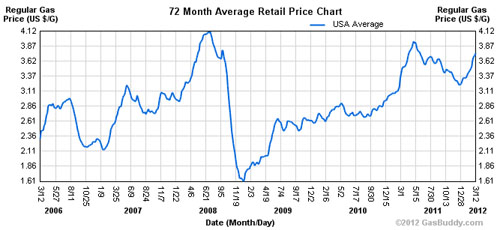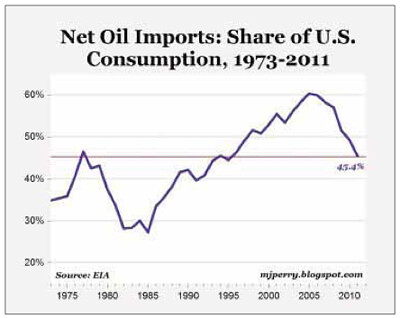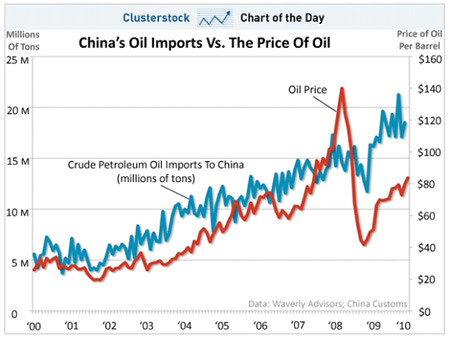Did Bush Jawbone Gas Prices Down? That's a Big No
The President was getting hammered on gas prices. Under increasing pressure from the press and the other party, administration officials repeatedly insisted there is no "magic bullet" or "magic wand" to bring prices down at the pump. Making matters worse, the President was embarrassed during a White House press conference during which he shockingly admitted "I hadn't heard that" a gallon of gasoline would soon hit $4. More humiliating still, he had come into office boasting that he would "jawbone" OPEC into opening the spigots and thus lower the price of oil.
The President, of course, was George W. Bush. And four years later, Americans are learning that despite a surge in domestic production and a drop in U.S. consumption, there is indeed no single "silver bullet" to lowering gas prices in the face of insatiable Chinese demand, tensions with Iran and the manipulations of market speculators.
Of course, candidate Bush promised the American people he would solve the nation's energy woes not with a silver bullet, but with his silver tongue. Just as important, easing the pain at the pump wouldn't require any sacrifice. On May 7, 2001, Bush press secretary Ari Fleischer was asked "does the President believe we need to correct our lifestyles to address the energy problem?" Fleischer's infamous response made clear energy conservation was off the table for President Bush:
"That's a big no. The President believes that it's an American way of life, and that it should be the goal of policy makers to protect the American way of life."
Instead, George W. Bush promised to get biblical on OPEC.
His pledge to persuade, cajole and other twist arms dated back to his first run for the White House in 1999. As oil prices rose to the then-alarming level of $30 that December, then Governor Bush said President Clinton "must jawbone OPEC members to lower prices." At a New Hampshire Republican debate the next month, Bush claimed the mantle of the Great Persuader. Contending that his days in the West Texas oil fields made him uniquely qualified for the task, Bush proclaimed:
"What I think the president ought to do is he ought to get on the phone with the OPEC cartel and say we expect you to open your spigots...And the president of the United States must jawbone OPEC members to lower the price...
...I used to be in the oil business. I was little oil -- really little oil. And so I understand the -- I understand what can happen in the marketplace."
By June 2000, the Bush jawbone pledge became a standard on the stump. As the New York Times reported, Bush foreshadowed future expenditures of political capital he would fail to accumulate:
"I would work with our friends in OPEC to convince them to open up the spigot, to increase the supply," Mr. Bush, the presumptive Republican candidate for president, told reporters here today. "Use the capital that my administration will earn, with the Kuwaitis or the Saudis, and convince them to open up the spigot."
That November, of course, the American people were persuaded. Despite Bush's own personal record of busts and bailouts in the business, his family's close ties to Prince Bandar and the Saudi royal family, Americans must have reasoned, should count for something.
As it turned out, not so much.
By the time he left office in 2009, Bush had failed at every turn to get his Persian Gulf friends to bump up production or slash prices. Other times, he didn't even try.
In the spring of 2004, the White House trumpeted Saudi Prince Bandar's commitment to maintaining the price of oil in the range of $22 to $28 a barrel. With the price then at $33 a barrel, by April speculation ran rampant that President Bush had secured a deal with the Saudis just in time for the November election. But as a barrel reached then-record levels topping $50, it became clear that both Bush and Bandar were backing off their past pledges. As CBS News reported that September:
As gas topped a record level of $50 a barrel this week, Mr. Bush has shown no propensity to personally pressure, or "jawbone," Mideast oil producers to increase output.
A spokesman for the president reportedly said in March that Mr. Bush will not personally lobby oil cartel leaders to change their minds.
In the spring of 2005, President Bush returned to his failed formula on oil prices. Promising to use his self-proclaimed charm to woo the Saudis, Bush would ultimately leave the American people to the mercy of the marketplace. As the AP detailed:
In a CNBC interview, Bush said he would press the Saudi crown prince to boost production. "I'll be talking to our friends about making sure they understand that if they pinch the world economy too much, it'll affect their ability to sell crude oil in the long run," Bush said.
Jerry Taylor, an energy analyst at the Cato Institute, a Washington-based think tank that advocates less government regulation, said the idea that "jawboning OPEC or arranging for nice relations with OPEC will somehow get us more oil is utter illusion."
An illusion, indeed. As the price of a barrel oil surged into record territory in March, OPEC dismissed out of hand President Bush's latest use of his jawbone. Pointing to the collapse of the dollar during the Bush presidency and the slumping American economy, OPEC leaders are not budging on production levels or prices:
"OPEC is angry that President Bush wants them to increase production while the dollar is sinking and the administration is doing nothing about that," said Fadel Gheit, an oil analyst at Oppenheimer & Company in New York. "It"s really not surprising that they have ignored him."
Back in Washington, President Bush that April was left to grouse about Congress for a situation he insisted was not his fault. In prepared remarks peppered with accusations of Congressional inaction, Bush opened with a salvo aimed at Capitol Hill. "I've repeatedly submitted proposals to help address these problems," Bush said, "Yet time after time, Congress chose to block them." Ultimately, a frustrated George W. Bush suggested the energy crisis called for a higher power:
"And so I firmly believe that -- you know, if there was a magic wand to wave, I'd be waving it, of course."
By early 2008 when a barrel of oil reached $127, President Bush's impotence in the face of the stratospheric - and uninterrupted - rise in gas prices reached comic proportions. Asked by a reporter on February 28, 2008 about the looming arrival of $4 gas, Bush the former oil man did what comes naturally and played dumb:
Q What's your advice to the average American who is hurting now, facing the prospect of $4 a gallon gasoline, a lot of people facing --
THE PRESIDENT: Wait, what did you just say? You're predicting $4 a gallon gasoline?
Q A number of analysts are predicting --
THE PRESIDENT: Oh, yeah?
Q -- $4 a gallon gasoline this spring when they reformulate.
THE PRESIDENT: That's interesting. I hadn't heard that.
By his July 15, 2008 press conference, President Bush feebly acknowledged that he was "aware of it now." But, he insisted, Americans' pain at the pump was psychosomatic and could be cured by the GOP mantra of "drill, baby, drill":
"I readily concede that, you know, it's not going to produce a barrel of oil tomorrow, but it is going to change the psychology."
Ultimately, of course, it was only the disastrous Bush recession - and not the supposedly persuasive Bush jawbone - which temporarily brought a steep drop in gas prices and consumption.
Four years after punishing both George Bush and John McCain over gas prices, Barack Obama is trying to give the American people some straight talk about gas prices once again hitting the $4 a gallon mark. "We can't just drill our way out of this problem," Obama explained, adding, "While we consume 20 percent of the world's oil, we only have 2 percent of the world's oil reserves."
But with new polling from ABC and the Washington Post showing that rising gas prices are reviving their bid to reclaim the White House, Republicans are using the opportunity to bludgeon President Obama. While Newt Gingrich thundered that "gasoline prices are unacceptable" and Mitt Romney said Obama is "in part" to blame, Rick Santorum charged that "We need a president who is on the side of affordable energy."
Sadly for the GOP messengers, the data suggest that something else is afoot in the oil market. After all, domestic crude production began rising in 2009, helping lower U.S. imports to 45 percent of American consumption from 60 percent as recently as 2005. Meanwhile, as BusinessWeek documented, "demand in the U.S. is at its lowest point since 1997." All of which means American motorists are once again at the mercy of the endless need of countries like China, tensions in the Persian Gulf and the apparent greed of speculators here at home.
Despite the bad news for President Obama, Brad Plummer of the Washington Post explained Monday "why gas prices aren't likely to sway the 2012 election." But while the White House has gone on the offensive about energy prices, Plummer points out that in terms of finding near-term relief for consumers, "options are limited." Which is why both President Obama and his spokesman Jay Carney like their Bush administration counterparts before them have been quick to acknowledge that there are "no magic solutions." As for jawboning the price of gas down?
That's a big no.
(For more background, see "Gas Prices Rising Despite Surge in U.S. Production, Drop in Demand.")






